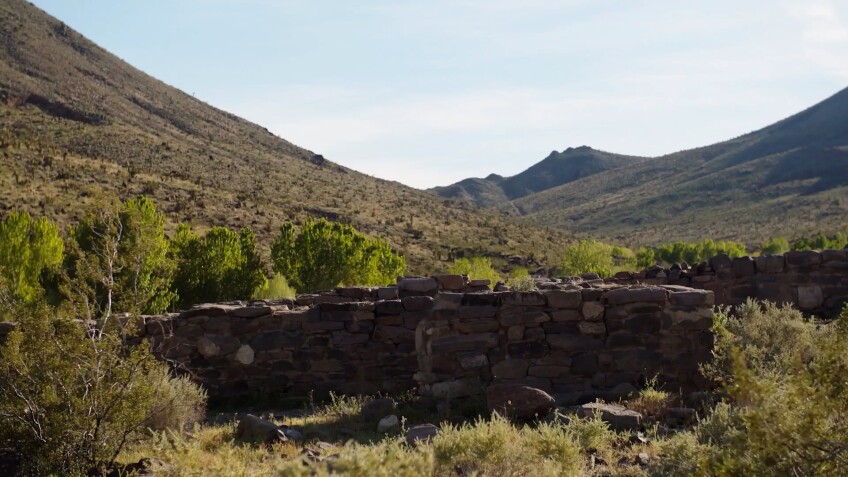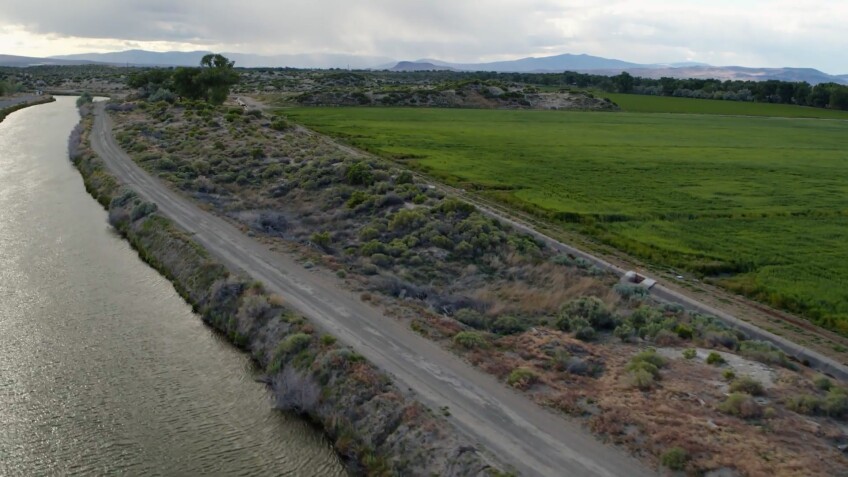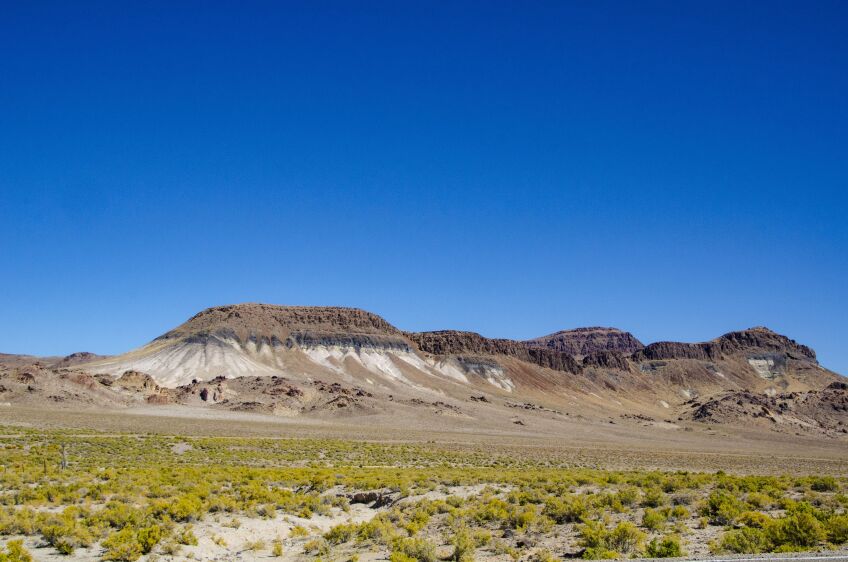Harry Reid’s Last Request: 'Home Means Nevada'

Home means Nevada.
Home means the hills.
Home means the sage and the pines.
When Brandon Flowers, lead singer for The Killers, sang these words at a memorial service for the late Senator Harry Reid, he did more than lead the crowd in a heartfelt a cappella rendition of Nevada’s state song, “Home Means Nevada.”
He recognized how Harry Reid, over 34 years serving the state in Congress, had definitively helped change the image of Nevada from a wasteland to a place worthy of love and care, a home.
The song begins:
Way out in the land of the setting sun
Where the wind blows wild and free,
There’s a lovely spot, just the only one
That means home sweet home to me.

Harry Reid grew up in that land, in a busted down mining town where the wind blew “wild and free.” Searchlight would have been a ghost town if it weren’t for the dozens of brothels that thrived there in the aftermath of a short-lived gold boom in the early 20th century. That “lovely spot,” for Reid, was an oasis in the mountains outside of town, Piute Springs, where he escaped as kid.
Brandon Flowers introduced the song, saying, “I first met Senator Reid in 2009, and we were lucky enough to tour the Capitol. It was an inspiration for me because here was the Senate majority leader, and he came from basically the same dirt that I came from, and we shared the same faith.”
Like Reid, Flowers is a member of The Church of Jesus Christ of Latter-day Saints and a Nevadan through and through.
“It wasn’t five minutes into the meeting when he waved for Chuck Schumer to come in and he had me sing the Nevada state song in the office,” Flowers said, as the audience laughed. Schumer was at the memorial, too, along with President Joe Biden, former President Barack Obama, and many members of both parties in Congress, as well as Reid’s family and dozens of members of “Team Reid,” as his loyal staff call themselves.

“I think he was showing me off a little bit,” Flowers said, “but I also think, as we’ve all heard today that he just loved where he was from, and it makes it a lot easier for me to stand here and tell you how much I love Nevada.”
Here is the land which I love the best,
Fairer than all I can see.
Deep in the heart of the golden west,
Home means Nevada to me.
When Reid asked Flowers to sing to Schumer, he was helping Schumer to feel that love. He had been spreading love for his home state ever since he was first elected to the U.S. House of Representatives in 1982 and began working to create Nevada’s first and only national park, Great Basin National Park, established in 1986.
At the time, Nevada was still perceived as a wasteland, a place suitable for blowing up atomic bombs and burying high-level nuclear waste. In 1987, Reid’s first year in the U.S. Senate, his congressional colleagues voted overwhelmingly in favor of a bill to short-circuit a scientific process for choosing the safest site for toxic, deadly nuclear waste storage. Instead, they designated Yucca Mountain, just 100 miles north of Las Vegas, as the only site to be considered. The brazen political move became known as the “Screw Nevada Bill.”
As Reid’s power grew in the Senate and he went on to become Senate Majority Leader, he starved the Yucca Mountain bill to death. All that is left of the plan is a pile of rusting equipment in an abandoned tunnel. The final nail in the coffin for Yucca Mountain came when Reid persuaded President Obama to designate Basin and Range National Monument in 2015. The nearly one million acres of stunningly beautiful mountain ranges and desert valleys sit, coincidentally, right athwart a railroad route for bringing nuclear waste to Yucca Mountain.
Out by the Truckee’s silvery rills,
Out where the sun always shines,
Here is the land which I love the best,
Fairer than all I can see.

In between establishing Great Basin National Park and Basin and Range National Monument, Reid brokered an end to a century-old water war on northern Nevada’s Truckee River. The negotiated settlement revolutionized the way the river is managed, to mimic natural flows, protect the endangered fish species on the Pyramid Lake Paiute Reservation, and provide drought supplies for the cities of Reno and Sparks. He initiated annual summits to bring together the federal government and the states of California and Nevada to protect Lake Tahoe at the river’s headwaters.
He designated more than four million acres of wilderness across the state, helped pass a bipartisan bill to enable Las Vegas to continue to grow while protecting surrounding public lands, and kickstarted the end of coal and a transition to renewable energy, including the first utility-scale solar plant controlled by a Native American tribe at the Moapa River Indian Reservation.
Reid’s commitment to protecting the environment, still little recognized even in Nevada, was not just an homage to a state that was often overlooked. His work was about ensuring that future generations would be able to enjoy and make a home in the Nevada he knew.

The Nevada of sagebrush and pine covered mountainsides, ancient quaking aspen groves, willow thickets along desert streams, and rocky canyons home to prairie falcons, golden eagles, and bighorn sheep is the state that Reid loved.
Whenever the sun at the close of day
Colors all the western sky,
Oh, my heart returns to the desert grey
And the mountains towering high.
Where the moonbeams play in the shadowed glen
With the spotted fawn and doe,
All the live long night until morning light,
Is the loveliest place I know
Having grown up among the Joshua tree forests and dry hills of Searchlight, Nevada, Harry Reid felt there was no landscape more worthy of protection. For an often taciturn westerner of few words, “Home Means Nevada” expressed the sentimentality he rarely showed in public, though he often shared it with family, friends, and colleagues privately. He found beauty in the creosote flats and vast open spaces, and he understood how a lone desert spring could make an otherwise forbidding landscape lovely to people and wildlife.
Reid’s son Leif told the friends and colleagues gathered at his memorial that music provided solace and helped ease the pain for his father in his final days. With family gathered around on his last day, they asked him what he would like to hear.
"Bob Dylan? No response," said Leif. "Bruce?" they asked. "No."
Then they asked, "Brandon?"
Reid smiled and gave a thumbs-up.
Leif said, "That was the last musical request he had."
Graham Chisholm is a senior policy adviser at the Conservation Strategy Group. Jon Christensen is an adjunct assistant professor in the Institute of the Environment and Sustainability and Luskin Center for Innovation at UCLA. View KCET’s documentary on Harry Reid’s environmental legacy at "The New West and the Politics of the Environment."





